Church and Rural Society: Just Stories of Decline?

A contribution by Jacobine Gelderloos . Regularly I come across voices who express doubts about the relevance of the church for society, both inside and outside the church. People who say that the church is ‘out of touch’ with society, that the church is outdated because it has not been able to keep up with developments in society – the church seems to speak another language than the rest of our daily world.[1] This does not seem to be a very motivating starting point when researching the question in what way church communities contribute to the quality of life in rural areas. One could expect to dig up stories about decline and the closing down of the churches only. Has not God disappeared from Jorwerd?[2]
But then again the two main topics of my research, the quality of life in rural areas and discussions about secularization and the relevance of the church, are also themes about which several studies have been published and various media report about it regularly.[3] This is not surprising when one considers all the changes that occurred in both the country side and in the church in the last few decades. Villages in rural areas are no longer places where people live their whole life. For most people it is the place where they have their house, but for their work, their social life, shops, social services of cultural facilities they may choose or sometimes also have to go elsewhere. Which is not to say that people do not feel any commitment with the place they live, but the way in which they are involved in village life may vary according to circumstance. In the debate about the quality of life in rural areas most attention is being paid to ageing and shrinking populations.[4]
A declining number of people is also a well-known phenomenon in the church. Especially in the Catholic and Protestant church in the Netherlands, the number of members have decreased rapidly. Since the 1960s the position of the church in society has changed dramatically. From an institute with a huge influence in politics, moral and social life, the church has become the most distrusted institute in Dutch society.[5] Then again, sociological research has shown that churchgoers are more inclined to participate in the voluntary sector and to give to good causes, then people who are not involved in the church.[6]
What struck me most when I was exploring these subjects are the many parallels between the two topics. Especially the word cooperation occurs time and again in both discussions. Not only church communities are thinking about cooperation with other congregations in order to survive, but also schools, social services and municipalities are working together on regional levels often resulting in amalgamations. Other parallel themes might be ageing and a decreasing involvement in community life due to changing lifestyle. And last but not least, what to do with unoccupied houses, schools, shops and churches? So are the church and (rural) society facing the same challenges? If so, are church and (rural) society aware of this and are there possibilities to join forces by sharing experiences and ideas? By diving into the congregational and village life in North-Brabant and Groningen I hope to find some answers to these questions.
Jacobine Gelderloos is a PhD student at the Protestant Theological University in Groningen, examining the contribution of faith communities to the quality of life in rural areas in Groningen and North-Brabant.
[2] geertmak.nl.
[3] uitzendinggemist.nl; scp.nl
[4] www.youtube.com
[5] trouw.nl.

